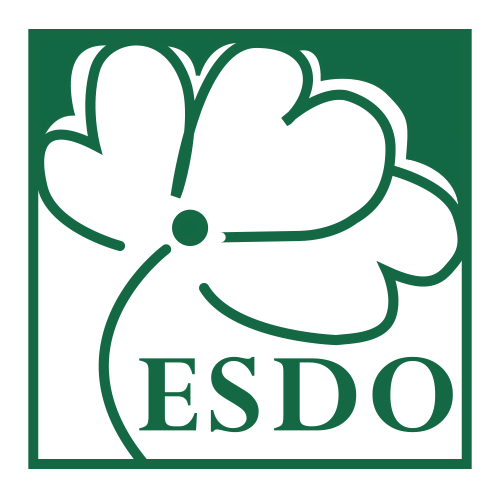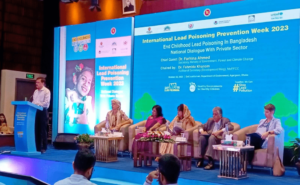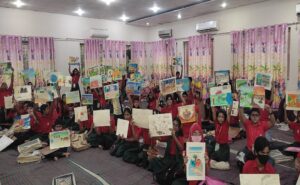Background
Single-use plastics or disposable plastics are used only once before they are thrown away or recycled. Single use plastic includes drinking straws, Plastic cotton buds, Sachets, food packaging, coffee stirrers, water bottles and plastic bags etc. The main problem with these single use plastics is they are non-recyclable and non-biodegradable. They slowly break down into smaller fragments known as microplastics. In the process of breaking down, it releases toxic chemicals which enter into our food chain and water supply. These toxic chemicals are now being found in our bloodstream. And the latest research has linked them to cancer, infertility, birth defects, impaired immunity and many other ailments.
Bangladesh Scenario of SUP
In Bangladesh, manufacturers are using single use plastic for packaging various food products, household and personal care products. Straw and plastic cutleries are also widely used. Because of its adverse effect on human health and environment, ESDO conducted a preliminary survey for the market assessment of plastic Straws and plastic cutleries in the old town of Dhaka city (Begumbazar and Moulovibazar). From the initial survey, it is estimated that only from old town in Dhaka, around 250 tons of single use straws and plastics cutleries are being sold per month, in different parts of Bangladesh. It is estimated from ESDO study that with other sources around 312 tons single use plastics are being sold per month in all over Bangladesh. The amount was calculated through a questionnaire survey which was done both for whole sale manufacturer and retailers. Only from 5 straw and cutleries manufacturer companies, around 9 core 75 lak pieces of single use plastics are selling in each month in the form of straws and cutleries which weight is equivalence to 195 tons per month. On the other hand, from the 25 retailers, around 50 tons of single use plastics are produced in the same way in Chokbazar area. Among these single use plastics, approximately 80 to 85% are discarded waste which end point is in the drain, river or ocean and this are creating massive pollution in the nearby rivers and at the end in the bay of Bengal. In Bangladesh, Chakbazar old town is the only area from where they are whole sells plastic straws and cutleries all over in Bangladesh.
From the secondary study, it is found that for Lollipop chocolate, they use single use plastic as sachets and plastic straws for packaging. Market is dominated by 3 popular brands in Bangladesh and they have approx. 80% lollipop in the market. Big brands in Bangladesh like Pran RFL group, Meridian group and Romania group are dominating in this situation. For juices Shezan, ACME, Bd Foods Ltd, Frutica , Sonic , Ipsi and some Local companies have single use plastic straw products. For plastic cotton buds, Fay produce in Bangladesh and some other brands as for example -Farlin, linco, UNAC Personal care, Feather Touch Cotton Buds, Johnsons Cotton Buds, Cotton Bud Big BoX are widely imported plastic cotton buds companies in Bangladesh.
Brand Audit on Single use Plastic
ESDO also did a Brand Audit of single-use plastics and this Brand Audit is a tool prepared by “Break free from Plastic (BFFP)” global movement. Brand audits are about creating corporate accountability for the plastic pollution that litters our lake, ocean, waterway, and communities. The ‘Brand Audit’ program comprised collection of plastic sachets and packages of different brands and classifying them. From the Brand Audit and survey total 180 Brands of 95 producers were identified. On the basis of product types it was found that for Household product, Food product, Personal care product and for other mixed items, the total 97.50 kg plastic waste was collected from one kilometer area of Dhanmondi Lake within 2 hours. From ESDO study it is found that, in Dhanmondi around 2.33 ton of plastic waste could be collected in 12 hours a day. Our mega city Dhaka is comprised of around 17 million people. According to population size and total area of Dhaka, it is calculated that only in Dhaka city every day around 200 tons of plastic wastes are collected everyday. Various brands both local and international are responsible for this single use plastic pollution. From the Brand Audit in Dhanmondi it is found that “Manufacturer like PRAN-RFL, Abul Monem LtD , Bombay sweets company, Nomad foods limited, Dhaka ice cream international limited, Nestle, Unilever, Square, Meridian group, and Perfetti Van Melle Bangladesh Pvt Ltd. Plays a major role for non-recyclable plastic pollution in Dhaka.
Impacts on Human Health and Environment
Single use plastic contains various polymers. Plastic Bags, trays, containers, food packaging film contains Low Density Polyethylene (LDPE), Cutlery, plates and cups contains polystyrene (PS), Hot drink cups, insulated food packaging, protective packaging for fragile items contains Expanded polystyrene (EPS), Microwave dishes, ice cream tubs, potato chip bags, bottle caps contains Polycarbonate polypropylene (PP). Foamed plastic contains styrene and Benzene which are toxic and carcinogenic. They have severe effects on our respiratory, nervous system and also in reproductive systems. While producing they emit greenhouse gases, block waterways and exacerbate natural disasters. They also create breeding grounds for mosquitoes and pests by clogging sewers and could increase the transmission of vector-borne diseases like malaria.
Various Country initiatives for Banning Single use plastics and its alternatives
There are so many countries all over the world have taken initiatives to Ban or reduce the consumption of Single-Use Plastics. Costa Rica now aims to become the first country in the world to ban all kinds of single-use plastics by 2021. In Vancouver of Canada, Great Britain, Sikinos island of Greece, New Delhi of India, Guatemala, Glasgow of Scotland, Taiwan, European Union, Switzerland and some states of America took strong initiatives for banning plastic straws immediately. Bangladesh also should come forward to stop the use of this Single use plastic for saving the nature and environment. To stop this pollution, we can think about alternatives of plastic straws and single use plastics. Environmentally more friendly alternatives of plastic straws as for example Bamboo straws, Glass straws, Metal straws, Stainless Steel Straws and Paper straws could be a better options in this situation.
References
- https://www.earthday.org/plasticban/
- http://meridiangroupbd.com/our-business/meridian-foods-ltd/products/export/
- http://www.assignmentpoint.com/business/finance/annual-report-2016-of-pran-agricultural-marketing-company-limited.html
- http://www.theindependentbd.com/post/164576
- https://www.reusethisbag.com/articles/where-are-plastic-bags-banned-around-the-world/


